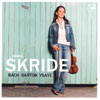Bach; Bartók; Ysaÿe Solo Violin Works
A young violin star braves a demanding programme and wins through
View record and artist detailsRecord and Artist Details
Composer or Director: Béla Bartók, Eugène (Auguste) Ysaÿe, Johann Sebastian Bach
Genre:
Instrumental
Label: Sony Classical
Magazine Review Date: 3/2006
Media Format: Super Audio CD
Media Runtime: 78
Mastering:
Stereo
DDD
Catalogue Number: SK92938

Tracks:
| Composition | Artist Credit |
|---|---|
| (3) Sonatas and 3 Partitas, Movement: Partita No. 2 in D minor, BWV1004 |
Johann Sebastian Bach, Composer
Baiba Skride, Violin Johann Sebastian Bach, Composer |
| (6) Sonatas for Solo Violin, Movement: No. 1 in G minor |
Eugène (Auguste) Ysaÿe, Composer
Baiba Skride, Violin Eugène (Auguste) Ysaÿe, Composer |
| Sonata for Solo Violin |
Béla Bartók, Composer
Baiba Skride, Violin Béla Bartók, Composer |
Author: DuncanDruce
The Latvian violinist Baiba Skride won the 2001 Queen Elizabeth competition in Brussels. Surprisingly, this is her first solo recording, but I’m sure we’re going to hear a lot more from her. She’s indeed a magnificent player, with a bold style that puts strong expression foremost, yet without any compromise in tonal quality or accuracy. The only way she could be said to make things easy for herself is in allowing plenty of time: in the Bartók, for example, each movement takes significantly longer than the printed timing, and one could argue that Leila Josefowicz’s less polished performance of the Fuga, sticking closely to the metronome markings, comes closer to Bartók’s intentions (Philips – nla).
But Skride’s care for questions of sound and articulation opens up the music, so that we’re aware of what lies behind the exciting, somewhat aggressive exterior. Christian Tetzlaff does something similar but his account is on an intimate scale, whereas Skride projects her performance in the grandest manner.
There’s a comparable contrast between her Bach and Julia Fischer’s. Fischer, with lighter tone and more varied gradations of volume, may give a more stylish impression, while Skride, buoyed by a firm sense of rhythm, never allows her more sustained manner to sound bogged down. The Chaconne is especially impressive, with its powerful sense of continuity. In the Ysaÿe, Skride’s strong presence, expressive warmth and confident technique ensure a most convincing performance. The one thing missing is the scherzoso element in the Allegretto third movement. But this is a programme to test the range of even an outstanding, mature young artist.
But Skride’s care for questions of sound and articulation opens up the music, so that we’re aware of what lies behind the exciting, somewhat aggressive exterior. Christian Tetzlaff does something similar but his account is on an intimate scale, whereas Skride projects her performance in the grandest manner.
There’s a comparable contrast between her Bach and Julia Fischer’s. Fischer, with lighter tone and more varied gradations of volume, may give a more stylish impression, while Skride, buoyed by a firm sense of rhythm, never allows her more sustained manner to sound bogged down. The Chaconne is especially impressive, with its powerful sense of continuity. In the Ysaÿe, Skride’s strong presence, expressive warmth and confident technique ensure a most convincing performance. The one thing missing is the scherzoso element in the Allegretto third movement. But this is a programme to test the range of even an outstanding, mature young artist.
Discover the world's largest classical music catalogue with Presto Music.

Gramophone Digital Club
- Digital Edition
- Digital Archive
- Reviews Database
- Full website access
From £8.75 / month
Subscribe
Gramophone Full Club
- Print Edition
- Digital Edition
- Digital Archive
- Reviews Database
- Full website access
From £11.00 / month
Subscribe
If you are a library, university or other organisation that would be interested in an institutional subscription to Gramophone please click here for further information.




